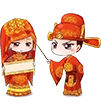春节古诗的英文-春节古诗英文版带翻译四年级
- 明镜
- qiazhi
- 2024-02-06 17:39:01
1 春节古诗的英文
Spring Festival, also known as Chinese New Year, is the most important traditional festival in China,Celebrated on the first day of the lunar calendar, it marks the beginning of a new year and a new cycle,Just like Christmas in the Western world, Spring Festival is a time for family reunions, feasting, and joyful festivities.
During Spring Festival, people express their wishes for a prosperous and peaceful year ahead,The celebration is imbued with rich cultural traditions, including the recitation of ancient poems,These poems, often beautiful and lyrical, convey the joy and enthusiasm of the festival, and they have been passed down through generations.
One well-known poem is "Spring Festival" by Su Shi, a renowned poet from the Song Dynasty,Here is the English translation of this classic piece:
The arrival of the Spring Festival is full of joy,
On this auspicious occasion, the air is filled with cheer.
Everywhere you go, there's a festive atmosphere,
As people gather together, their laughter rings clear.
The streets are adorned with lanterns and flowers,
Red is the color that signifies good fortune and power.
From door to door, people exchange New Year's greetings,
Wishing each other happiness and blessings worth reaping.
Firecrackers burst in the sky, creating a symphony of sound,
Dragon and lion dances captivate the crowd around.
The aroma of delicious food wafts through the air,
Families sit together, a feast beyond compare.
Children receive red envelopes with money inside,
A symbol of good luck, their faces full of pride.
The sound of laughter echoes through the house,
As everyone rejoices, forgetting all their doubts.
With the dawning of a new year, new hopes arise,
People forget past troubles, looking to the skies.
May the year ahead be filled with joy and endless cheer,
May all find success and prosperity in the coming year.
This poem captures the essence of Spring Festival, with its depiction of joy, togetherness, and celebration,It showcases the vibrant atmosphere during this festive season, as well as the traditions and customs associated with the holiday.
Besides Su Shi's poem, there are many other ancient Chinese poems that celebrate the arrival of Spring Festival,These poems, with their elegant language and profound meanings, have become an essential part of the holiday's cultural heritage,They evoke a sense of nostalgia and remind people of their roots and heritage, fostering a deep appreciation for Chinese traditions.
In conclusion, Spring Festival is a time of joy, togetherness, and celebration,Ancient poems play a significant role in conveying the spirit of this festive occasion,They reflect the rich cultural heritage of China and remind us of the importance of family, tradition, and hope for a brighter future,As the Spring Festival continues to be celebrated, these beautiful poems will continue to be cherished and recited by generations to come.

2 春节古诗英文版带翻译四年级
The Spring Festival, or Chinese New Year, is the most important traditional holiday in China,It is celebrated on the first day of the Chinese lunar calendar, which usually falls between January 21 and February 20,During this time, families come together to enjoy delicious food, exchange gifts, and participate in various cultural activities,In this article, we will explore some ancient Chinese poems about the Spring Festival and provide English translations for fourth-grade students to appreciate.
1,"迎春花" (Welcoming Spring Flowers) by Wei Yingwu
春风又绿江南岸,明月何时照我还。
乘兴而行 眼前忽万千。
万千中有一千好,明媚动人如朝暮。
摘花不是为招蜂,摘得花来摘得心。
English Translation:
Green spring breeze on the southern shore,
When will the bright moon shine upon me once more?
In this joyful journey, unexpectedly, countless beauties appear.
Among the countless, one thousand are good, brilliant and enchanting like morning and night.
Picking flowers is not to attract bees, but to pick blossoms and hearts at ease.
2,"过年" (Celebrating the New Year) by Wang Anshi
千门万户曈曈日,总把新桃换旧符。
外头初雪胜蓬莱,桃符扫入五才花。
迎春忙忙正走马,眉目如梅上雪花。
饭煮未定香炉火,侵寒试打麦门罗。
English Translation:
Thousands of houses and doors bathed in the shining sun,
Replacing old charms with new peach blossoms has begun.
The first snow outside excels over Penglai's glory,
Peach charms swept away, welcoming the Five Elements story.
Frantically welcoming the spring, rushing as if on a horse,
Features as elegant as plum blossoms with snow, of course.
As the rice cooks, the fragrance permeates the air,
Testing the cold, knocking at doors without a care.
3,"元夕" (Fifteenth of the First Month) by Su Shi
欢娱今夜复何如,随分干戈易祸胥。
先生遭罪成今日,庙堂闻听到公卿。
琴瑟之和声可乐,管筝之择南山赋。
皇风承运君臣乐,摇荡湖五斗鱼。
English Translation:
How can we celebrate joyfully tonight?
Wars and disasters easily befall, it's not right.
The suffering of a gentleman, now true,
Reaches the courts, heard by officials too.
The harmony of qin and se, brings joy in due course,
Choosing to write about South Mountain with guzheng's force.
The imperial breeze carries joy to the ruler and subject,
Stirring the waves of the lake, like swimming fish with no regret.
These ancient poems reflect the excitement, anticipation, and traditions during the Spring Festival,By exploring these poems and their English translations, fourth-grade students can appreciate the beauty of Chinese culture and the significance of the Spring Festival.








